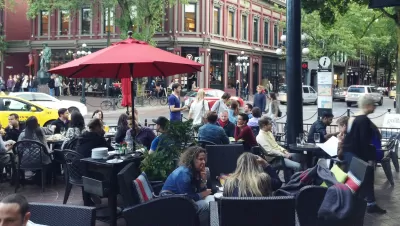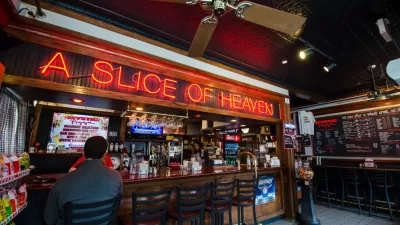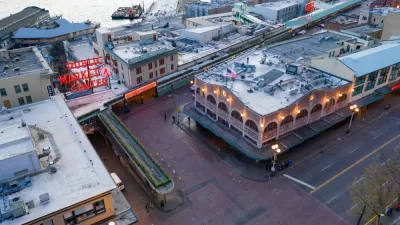A trend toward allowing restaurants and retailers to expand operations to the public realm outside their brick and mortar confines is quickly gaining steam.

First reports about cities allowing restaurants and retail businesses to spill out onto streets and into parking spaces started earlier this month and haven't let up. First it was Brookhaven, Georgia, then came Tampa, Florida and Hinsdale, Illinois. Now, people in cities as large as New York City, Houston, and Denver are having very public discussions about how to make al fresco commercial activity the new normal, and the Ned Lamont, the governor of Connecticut, took the extraordinary step of removing parking minimums for outdoor restaurant and retail activities, in addition to suspending some permitting processes and expediting approvals for outdoor activities.
Planners looking for ways to support their communities through the economic and public health impacts of the Covid-19 pandemic are thus presented with an obvious opportunity. An article by Sara Bronin, chair of Hartford, Connecticut's Planning and Zoning Commission, digs into some of the specific zoning reforms that can help pave the way for the transition to al fresco commercial activities. Bronin commences this discussion with the frank assessment that local zoning laws have been written to prevent exactly this kind of outdoor commercial activity for decades in the United States. Paris is illegal in the United States, according to Bronin.
What would it take to make a more Parisian built environment in the United States? Zoning reform, says Bronin. And the parts of the zoning code that can have the most benefit to businesses during the pandemic have to do with parking, as already put into action by Gov. Lamont in Connecticut, and described here by Bronin:
But it’s parking that will likely be the biggest barrier to moving indoor activities outside. With car use plummeting during the COVID-19 pandemic, many parking lots are sitting idle. Spots are likely to remain at least partly empty given that businesses will have to limit the number of patrons inside. Even if restrictions were completely lifted today, it will take months, maybe even a year or more — to fill these lots again. For grocers, restauranteurs, bar owners, and retailers, the possibility of converting these lots into usable space has a lot of appeal. But zoning laws will prevent most conversions, because of requirements that each lot has a minimum number of parking spaces.
For more ideas about how zoning codes can be revised to support more outdoor commercial activities, Broning cites a comprehensive rezoning process approved in Hartford several years before the onset of the pandemic, which included removing minimum parking requirements for all buildings.
FULL STORY: Can city life stay more al fresco post-pandemic?

Planetizen Federal Action Tracker
A weekly monitor of how Trump’s orders and actions are impacting planners and planning in America.

Congressman Proposes Bill to Rename DC Metro “Trump Train”
The Make Autorail Great Again Act would withhold federal funding to the system until the Washington Metropolitan Area Transit Authority (WMATA), rebrands as the Washington Metropolitan Authority for Greater Access (WMAGA).

The Simple Legislative Tool Transforming Vacant Downtowns
In California, Michigan and Georgia, an easy win is bringing dollars — and delight — back to city centers.

The States Losing Rural Delivery Rooms at an Alarming Pace
In some states, as few as 9% of rural hospitals still deliver babies. As a result, rising pre-term births, no adequate pre-term care and "harrowing" close calls are a growing reality.

The Small South Asian Republic Going all in on EVs
Thanks to one simple policy change less than five years ago, 65% of new cars in this Himalayan country are now electric.

DC Backpedals on Bike Lane Protection, Swaps Barriers for Paint
Citing aesthetic concerns, the city is removing the concrete barriers and flexposts that once separated Arizona Avenue cyclists from motor vehicles.
Urban Design for Planners 1: Software Tools
This six-course series explores essential urban design concepts using open source software and equips planners with the tools they need to participate fully in the urban design process.
Planning for Universal Design
Learn the tools for implementing Universal Design in planning regulations.
Smith Gee Studio
City of Charlotte
City of Camden Redevelopment Agency
City of Astoria
Transportation Research & Education Center (TREC) at Portland State University
US High Speed Rail Association
City of Camden Redevelopment Agency
Municipality of Princeton (NJ)





























